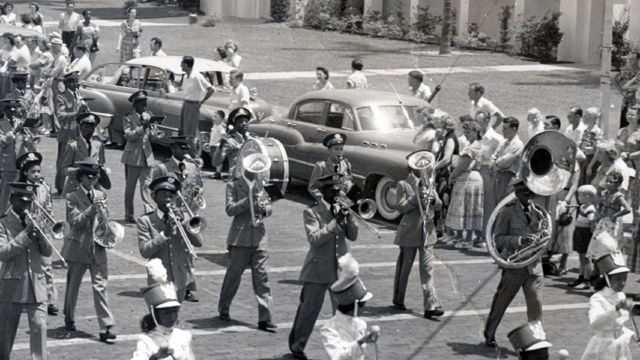Communiqué
In the Segregated South, Two Band Directors used Music to Unite Their Community “Marching Forward” – Feb. 24 at 10 pm
< < Back to in-the-segregated-south-two-band-directors-used-music-to-unite-their-community-marching-forward-feb-24-at-10-pmMarching Forward
In the Segregated South, Two Band Directors used Music to Unite Their Community
The film explores a story of unity in 1964 segregated Orlando, when one white high school marching band (Edgewater High School) and one black high school marching band (Jones High School) were invited to perform at the 1964 World’s Fair in New York City.
 Overcoming the racial segregation present in school and public places, both bands were able to reach the World’s Fair, crossing established racial lines and coming together through music and a sense of community. The film provides an opportunity to explore the moderately calm race relations of Orlando during the 1960’s, by contrasting the uplifting narrative about two high school bands with the backdrop of the violent and disturbing period of desegregation.
Overcoming the racial segregation present in school and public places, both bands were able to reach the World’s Fair, crossing established racial lines and coming together through music and a sense of community. The film provides an opportunity to explore the moderately calm race relations of Orlando during the 1960’s, by contrasting the uplifting narrative about two high school bands with the backdrop of the violent and disturbing period of desegregation.
This film was born out of an honors public history and documentary class at the University of Central Florida. Students conducted research and interviews. The two instructors continued the work of shooting and editing after the class ended with Oswmer Louis and Brittany Todd. This is the fourth film co-directed by Dr. Lisa Mills and Dr. Robert Cassanello with students in the Burnett Honors College.
 This historical documentary centers around fascinating characters with humorous and poignant stories that address the same issues of race, education, and equality with which the U.S. still struggles today. At its center are two high school band directors- one black, one white- who were ahead of their time because instead of seeing skin color, they saw talent. James W. “Chief” Wilson and Del Kieffner had the courage to cross color lines to do what they thought was best for their students.
This historical documentary centers around fascinating characters with humorous and poignant stories that address the same issues of race, education, and equality with which the U.S. still struggles today. At its center are two high school band directors- one black, one white- who were ahead of their time because instead of seeing skin color, they saw talent. James W. “Chief” Wilson and Del Kieffner had the courage to cross color lines to do what they thought was best for their students.
The documentary contains many wonderful historic photos and 16mm film footage, providing a feeling of nostalgia for what was surely a simpler time. However, in many other parts of the film we are reminded that the 1963-64 school year was also tumultuous, filled with civil rights protest marches and brutal racial violence. At one point a Jones alumnus recounts a time when he and other black band students demanded that a nearby hamburger stand take their money from the front counter instead of the back door. This action resulted in an Orlando Police response that afternoon at band practice.

